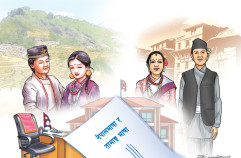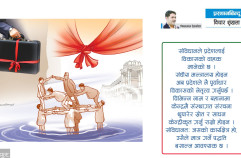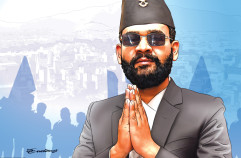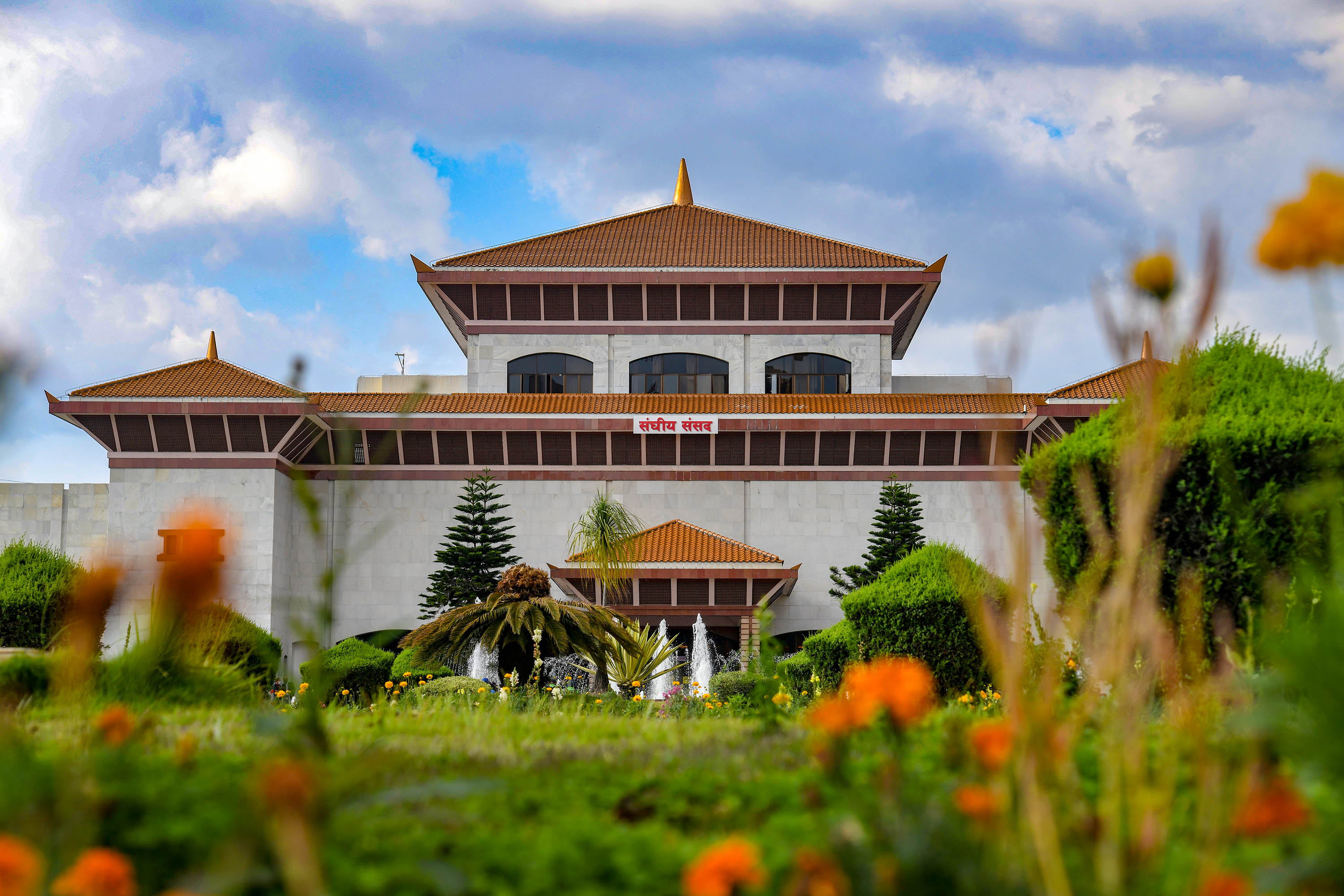Changed alliances, changed vision
We use Google Cloud Translation Services. Google requires we provide the following disclaimer relating to use of this service:
This service may contain translations powered by Google. Google disclaims all warranties related to the translations, expressed or implied, including any warranties of accuracy, reliability, and any implied warranties of merchantability, fitness for a particular purpose, and noninfringement.

CPN (UML), which separated from the government on February 16, 2079, joined the government again after one year on February 21, 2080. Every party keeps taking such favorable steps for power until a party has a majority. Although Prachanda remains the prime minister, the coalition has changed. UML has replaced the Congress as the main ruling party.



The UML achieved tactical success when the goal of every party was to address people's issues through power and power.
When the prime minister is the same, can there be a change in the administration of power? Will a ray of hope return to depressed citizens? There is no mathematical answer. There is a general curiosity that there is a fundamental difference when UML and Rashtriya Swatantra Party come to power with Prachanda remaining as the Prime Minister. Such generalizations are emerging as a depressing trend as part of the narrative that politics has ruined it.
Why did Prachanda change the alliance? There have been statements mixed with occult, insistence and revenge. Apart from KP Sharma Oli and Prachanda, no one has an official answer to this. It's just prejudice coming from a Congress leader who has unexpectedly crossed over to the opposition. The prime minister has made it the main issue for those who have not been able to provide services to the citizens after changing the alliance. Let him know if this is an excuse or reality.
Oli's statement in the context of trying to pull the northern neighbor into the new alliance is also important. He has asked that Prachanda and himself have a role in changing the alliance, not China, and that they should be given their due. Evidence is needed to disprove this statement of the new alliance leader.
Those who claim that China has played a role in changing the power equation of Nepal must give ground. Here the essence is completely neglected in favor of the form. Secondly, even if India says it does not want a Left-led coalition, it should be given a basis to prove it. New Delhi formally responded naturally to the change in Nepal's ruling coalition, stating that it was ready to cooperate. This is the language of Foreign Minister Subramaniam Jaishankar.
This article focuses on future hints rather than delving into the past. Some of the reasons why this coalition can give a feeling of power to the citizens are presented in it.
First, this coalition is basically a coalition of parties led by the left and with the slogan 'Let's do something'. Some of these parties have raised questions about the justification of federalism and especially the provincial government, but if that happens, it is not retrograde. The majority is the agent of change. UML, Maoist and United Socialists are not only left wing forces, they are thought leaders to institutionalize change. However, no system is immutable and if a system fails through use, a new one emerges. It became the law of nature.
The power collaboration with the ideologically opposite party Congress forced Prachanda to think about 'path reform' because from the left's point of view, it was a path of complete end. Let's not go into the politics of overthrowing the majority leftist government and making Sher Bahadur Deuba the prime minister. But Prachanda and Madhav Nepal were accused of destroying the environment of communist cooperation created on 10th of January 2079, and the communist arrogance did not allow them to express their regret publicly.
It's been a year since the left stood up to the truth. Prime Minister Prachanda was not even able to openly express his public opinion about the government's achievements. Not being able to remove a controversial minister from the Congress, pushing for the removal of a member of the cabinet who was doing a relatively good job, the effectiveness of the government fell below average. Similarly, the Koshi government, the member of the National Assembly, has not been able to publicize anything in terms of achievements other than political idolatry due to non-cooperation. That is why Prachanda has chosen the path of truth and reform rather than political end.
By making the coalition as homogeneous as possible, it becomes easier to exercise power. Rather than Prachanda becoming Prime Minister with Deuba's support, Oli's support became a relatively homogeneous alliance. This is a suitable alliance within the parliament considering that power should be shared between like-minded people. Today's world politics is not led by ideas, but ideas have not died either. Therefore, if ideology, theory and philosophy have any meaning in politics, than Prachanda created by Deuba, Prachanda created by Oli is more compatible in running the government. Efforts started to solve the problems of meter-banking victims after the investigation of the gold scandal are the result of that compatibility.
In theory, Prachanda and Madhav have not practiced anything different from the people's multi-party democracy. Saying you don't accept Jabaj and attacking Jabaj are all based on Jabaj. Prachanda became the prime minister after ten years of civil war. In other words, the final path of all the leftists is competition.
Second, the favorable entry into power of the new party RSVP. Even though RSVP has gained experience in power, the time has not come to charge it with the view of power management. Here is the paradox. The RSVP and its leaders, who swear that they are not from the old and big parties, have again come to power by cooperating with the same parties and leaders. Not to become a sadhu who did politics, but has a positive message been conveyed by cooperating with the old and incompetent party in their language? This party is not out of the question. But this party was not able to make people feel that they are different from the old parties by not going to the government. In that sense, the claim of RSVP to go to the government and make service delivery effective is based on logic.
The real test of any party is in power. A 'stunt' in politics is short-lived. Ravi Lamichhane, president of the RSVP, now wants to give the impression that he has done something in favor of the people. Coming for the second time as the leader of the Ministry of Home Affairs, which he chose himself, the hope he instills in the people through his work will determine the future of the RSP. Although he is more educated and knowledgeable than Ravi within the party, he is after unexpected political success. Despite propaganda and sometimes misleading propaganda, there is pressure on him to bring changes in policy and operations. Narayankaji Shrestha has made a positive start as Home Minister by taking risks. It is not enough to advance it, it should also be shown by doing something new. There are also questions about Ravi himself, the Congress is raising questions about him in the cooperative case and demanding an investigation. But in spite of that, his start as Home Minister is positive.
Third, prime minister of coalition, not faction. Although Deuba supported Prachanda, there were clearly two views within the Congress. The result was the rebellion of Koshi. Defeat of Maoist candidate from Koshi in National Assembly. As a result of that, the report of Deputy Chairman Poorna Bahadur Khadka and General Minister Gagan Thapa in the General Committee meeting, which Prachanda has made public as a factor in reaching the conclusion that cooperation with the Congress cannot be reached.
There were so many activities against Prime Minister Prachanda within the Congress that he was making the alliance fail. Deputy Chairman Khadka was a leader who said that the alliance should not be broken under any circumstances, but the report brought by him considered the people's war as unjustified. He brought such a report to show that despite the power alliance, he is not a lagging behind the Maoists. Whether you are a party worker or not, condemning people's war will get you nowhere. It is not necessary to both glorify and denigrate the past. Unlike the previous one, this alliance was not made by the factions of the ruling party, but by the party itself. Therefore, this alliance does not have to go through factionalism and opposition. However, two-line and multi-line conflicts are still going on due to the issue of grip within the party.
Fourth, deception limits and practices autonomy. The pressure of creative and active power. There are deceptions in politics, they will not end as long as politics lasts. In these more than seven decades after the establishment of the Congress and the Communist Party, betrayals within the party, betrayals between parties and alliances have become a regular practice of politics.
But there is a limit to the betrayal by one person. Prachanda has spent a treacherous time as the Maoist supremo and the third time Prime Minister. He would be the active leader of the party, but now he cannot keep himself politically alive by cheating on the power again. Due to this feeling, Prachanda can exercise an autonomy in the administration of power as the Prime Minister, which environment has been created by Oli. This is the right time for Prachanda to do something. For that, this alliance is more effective than before. And, Oli is much ahead of Deuba in every angle including approach, thinking, program and activism. The proof is the achievements during Oli's tenure.
Fifth, comparative proper cabinet. However, the selection and selection of every cabinet in Nepal is not above controversy. There is a significant participation of youth in the cabinet this time. Those who stand on the rostrum and frequently question ministers have also become ministers. They have innovative thinking and proactivity. There is also competition between ministers. This is a positive aspect. Ministers have been repeated and some below-average performers have become ministers, who could have been replaced by new ones. There are few examples in Nepal of those who failed the test being able to correct themselves. Forming an opinion about a minister without starting work can be biased. But no one is exempt from being average in assigned responsibilities. His politics as an individual will come to an end, while the search for alternatives as a party will gain power to non-political groups.
Nepal has become a laboratory for many political experiments. Nepal can no longer afford an endless chain of distorted laboratories. In that sense, the country will fall into more crisis when this power coalition laboratory of old, big and new parties continues. One alliance should not be a continuation of the other, there should be a new beginning of development and good governance. The government should focus on that.
प्रकाशित : चैत्र १५, २०८० ०८:५७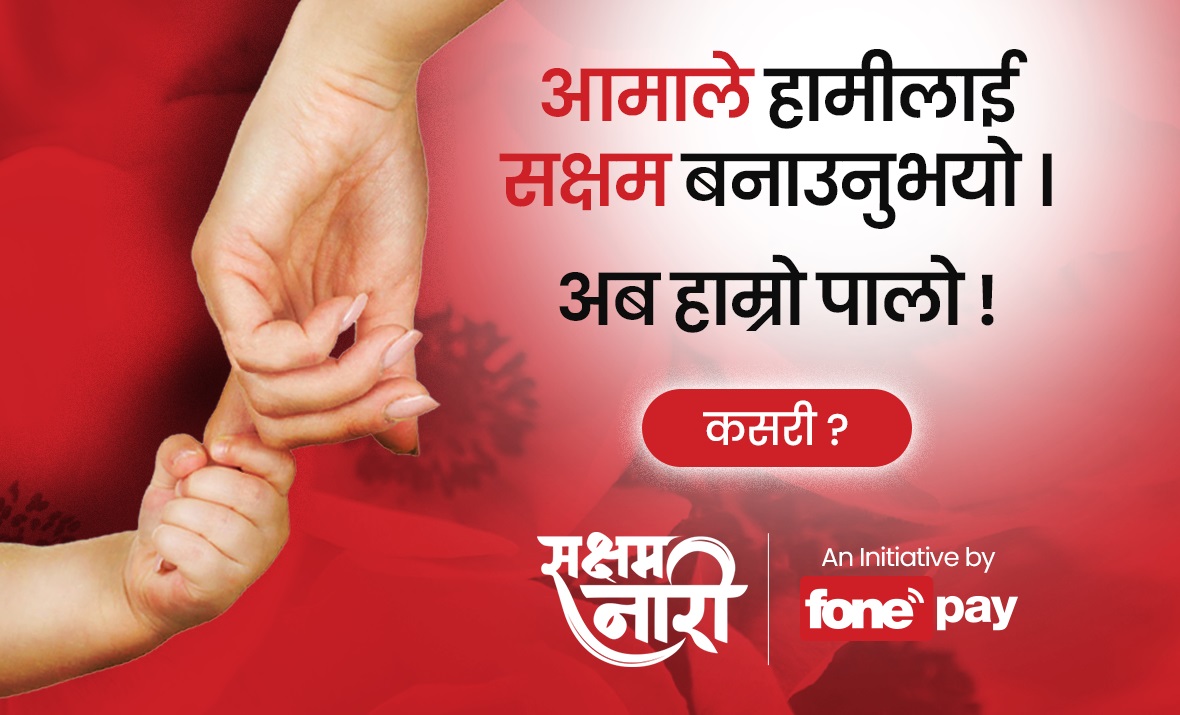

 १८.१२°C काठमाडौं
१८.१२°C काठमाडौं






